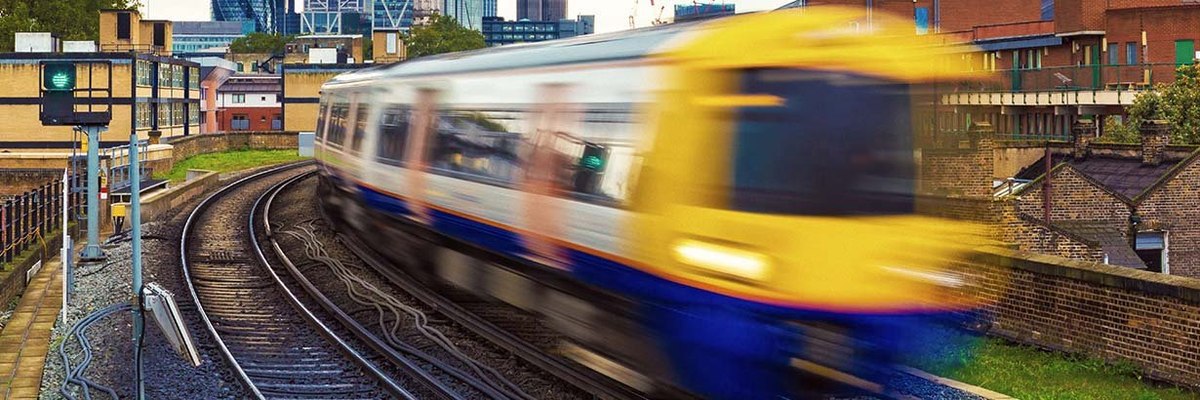Liberty proves to be the most well-liked, and Mildmay the least
On 15 February, Mayor of London Sadiq Khan announced the six new names for the branches of the London Overground as part of its rebranding.
The Overground branches, which are also being recoloured to make them easier to navigate, will now be called Lioness, Mildmay, Windrush, Weaver, Suffragette and Liberty.
The names were chosen as part of the £6.3m rebranding to reflect aspects of the city’s history, although some have called in to question the appropriateness of some names. The Weaver line, for instance, is named as it passes through areas that were historically part of the city’s textile industry – although it does not have a stop there.
Now the results of a new YouGov survey of 1,013 Londoners reveal show that some of the name choices have been far better received than others.
How popular are the new London Overground branch names?
The Liberty line proves to be the most well-received of the new names, with 41% of Londoners saying they like the name – 29% are indifferent, while only 20% dislike it.
The Windrush line comes second, with 35% of Londoners saying they like it – although 30% dislike it, while 24% say they neither like nor dislike it. The name is more popular among ethnic minority Londoners (40% like it) than white Londoners (32%).
While the Lioness line is the third most-liked, at 33%, the name is also divisive – 36% dislike it, the highest figure for any of the lines. The Suffragette line also divides opinion, with 29% having a positive view but 34% a negative one.
Men particularly tend to dislike both of these female-themed line names – 40% dislike Lioness and 38% dislike Suffragette, making them the two most unpopular lines among men. Women, by contrast, are divided on both lines.
The Weaver line comes fifth of six, with only 24% saying they like the name – outnumbered by the 30% who dislike it, who are in turn outnumbered by the 34% who don’t have strong feelings either way.
Mildmay proves to be the least well-liked line, with just 20% saying they appreciate the name. A third (33%) say they dislike the name, while the same number say they neither like nor dislike it.
In their own words – what do people make of the new line names?
Having asked Londoners how much they like each line name, we also asked them to tell us in a bit more detail why they felt that way.
Despite criticism in the media and on social media that the line names are ‘woke’, such sentiment was not commonly expressed in the responses.
The following are some common themes for each Overground line name.
Liberty line
A common criticism of the Liberty line was that the choice seemed too American
"It doesn't scream Britain. It screams American. It's also political instead of being about British culture"
"I think of 'liberty' as an American word. It doesn't tell me where the train goes to."
"It does sound a bit American but there is interesting history about the royal liberty of Havering"
"It's OK, but maybe more appropriate in Philadelphia"
Others were confused about the term’s relevance
"Its association/relevance is vague."
"Good ring to it, but unsure of connotations."
"Why, what is the reference? Liberty line sounds like a suicide hotline."
Some liked the simplicity of the name and its memorability
"Easy to pronounce, remember and not easily confused with existing lines."
"Alliteration. Easy to remember."
"Catchy, and a great word, whatever it’s specific reference."
Others liked the positive connotations of the word ‘liberty'
"The name "Liberty Line" has a very patriotic and symbolic feel to it. Liberty is a powerful and evocative word that can inspire feelings of freedom, equality, and justice. In the context of a line, it could also represent the idea of a connection or pathway to liberty. Overall, I think the name is very strong and would be well-suited to a brand that wants to convey a message of independence and freedom."
"Preferable to the others. It give me a sense of the freedom to explore London."
"I like that it reminds us we are free."
Lioness line
Many liked that the paid tribute to the women’s football team, and that it could be encouraging for women’s sport
"Brilliant great for women's sport and encouraging girls."
"Celebrates a great cultural moment."
"I think it celebrates and recognises something that needs to be recognised. A good way to remember the Euros and empowering."
"It’s grown on me. I like the idea of representing women in sport."
"LOVE this tribute to the Women's England footballers."
Others took issue with the association with football, or that the Lionesses had not actually won their tournament
"Only resonates with those who care for football. Will become outdated."
"Completely stupid - the girls have been incredible but a tube line? Really?"
"Would like a name referring to all women in sports, not just football."
"Called after our fifth-rate over hyped women's football team. No thanks."
"Do we celebrate all world cup losers?"
Some felt that the name is a bit ‘cringe’ and seems like TfL is trying too hard
"Feels a bit cringe.
"Feel like it’s trying too hard to prove the country cares about women."
"Performative."
"Silly and cliche. A little naff and will tire."
"Trying too hard."
Many expressed concern that the name will quickly lose its relevance
"It's plucked from a moment of popular culture and has no long term relevance."
"Honours a brilliant team, perhaps a bit short-term though."
"I think it's jumping on something that is popular at the moment."
"In five years’ time no one will know what it means!"
"Neutral, they represent Britain well but not sure how "long lived" their reputation would be."
Mildmay line
A common criticism was the Londoners had no idea what it was referring to
"Confusing. Unsure what this is referencing."
"Do not understand where the name comes from or its correlation with London or England."
"I am not sure what this references, but the name does not roll off the tongue."
"Means nothing to me. Never heard of Mildmay."
"No idea how you pronounce this name let alone what it's named after. Will anyone associate the name with the route? I doubt it."
Others were pleased to see the hospital and its history being acknowledged
"A good reminder of an important institution."
"I like it, highlights an important feature I didnt know about and taps into local history."
"I love Mildmay and I'm glad an HIV/AIDS hospital is getting the recognition it needs."
"It sounds catchy and not cheesy and significant historically."
"Very cool to see this part of history being recognised."
Suffragette line
Many appreciate the name choice to commemorate the historical significance of the suffragette movement and women's fight for the right to vote…
"A great homage to the way the UK lead the world in women’s rights."
"Excellent name honouring exceptional people."
"Great name to commemorate an iconic struggle."
"Great name to remind on the history of movement that was born here."
"Historical and important in this day and age where women are still not equal."
…but others thought that the suffragettes’ violent methods makes commemorating them a poor choice
"Appreciate the cause and achievement of the suffragettes but they used to bomb the railways and underground so the naming is inappropriate."
"Celebrating the people who put BACK the cause of women's suffrage!"
"I would have preferred the suffragists being celebrated. They were a non-violent group of men and women who are often overlooked."
Weaver line
Many Londoners said they did not understand the relevance of the name
"The name doesn't mean anything particular to me."
"No idea why it’s the weaver line."
"It's ok. I don't know who or what Weaver was."
"I'm very "meh" on this. I read something about the names and what they meant earlier this week, but I've already forgotten what the significance of Weaver is."
"Do not understand the word Weaver and it's importance with London/England."
Some who did understand it said they liked its historical significance
"Sounds nice, easy to say, linked to the industry of the time I think?"
"I like that it is a subtle hint to the history of the area."
"A good reminder of the textile industry the line flows through."
Windrush line
Many cited the positive recognition of the Windrush Generation, and immigration to London more broadly…
"Without the background, it still sounds interesting. I’d like it anyway. The rationale behind naming that particular route I find reasonable and appropriate."
"Well, I think the Windrush issue is relevant and it is good to create opportunities to talk about it."
"This is great acknowledgement of the Windrush generation."
"Shows the rich immigration history of London."
"Nice. It honours the (recent-ish) history of Black Londoners and acknowledges the importance of immigration to the city."
…although some saw the choice as insulting given that many Windrush victims still have not received compensation
“I would rather the government focus releasing funds to the people that suffered doing the Windrush. They have been too slow on this. Rename part of the overground as the Windrush line does nothing. In fact it causes more pain.”
“I really like it as a tribute, but it feels a bit hypocritical when the UK hasn’t made proper reparations to those mistreated by the Windrush scandal”
“Feels wrong when members of the Windrush generation have not been properly compensated for what they had to endure.”
Photo: Getty











